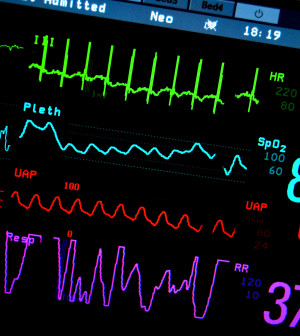- Could Your Grocery Store Meat Be Causing Recurring UTIs?
- Are You Making This Expensive Thermostat Error This Winter?
- Recognizing the Signs of Hypothyroidism
- 10 Strategies to Overcome Insomnia
- Could Artificial Sweeteners Be Aging the Brain Faster?
- Techniques for Soothing Your Nervous System
- Does the Water in Your House Smell Funny? Here’s Why
- Can a Daily Dose of Apple Cider Vinegar Actually Aid Weight Loss?
- 6 Health Beverages That Can Actually Spike Your Blood Sugar
- Treatment Options for Social Anxiety Disorder
Antibiotic Might Raise Heart Risks for Some


TUESDAY, Aug. 19, 2014 (HealthDay News) — Taking the widely used antibiotic clarithromycin may boost some patients’ odds of dying from heart-related causes, a new study suggests.
Because millions of people receive this antibiotic each year, the findings require urgent confirmation, said the Danish researchers behind the study. However, they emphasized that the actual risk is small and that guidelines for the use of the drug should not be changed until more information is available.
One heart expert wasn’t surprised by the finding, however.
“Some commonly used antibiotics should be taken with caution, especially for those people who are at risk for heart disease,” said Dr. Suzanne Steinbaum, a preventive cardiologist at Lenox Hill Hospital in New York City.
“As it has been shown before, not all antibiotics are created equal when it comes to increasing the risk of cardiovascular death,” she said. “If you have an underlying heart condition, be certain to discuss it with your doctor before taking an antibiotic prescription. There are definitely safer alternatives.”
Clarithromycin and another antibiotic called roxithromycin belong to a group of antibiotics called macrolides. It’s believed that macrolides increase the risk of potentially deadly heart rhythm problems, the Danish researchers explained.
In the study, they analyzed more than 5 million courses of antibiotic treatment with clarithromycin, roxithromycin, or penicillin V given to Danish adults, aged 40 to 74, between 1997 and 2011.
During this period, 285 cardiac deaths occurred — 18 during the use of clarithromycin and 32 during the use of roxithromycin. After adjusting for other factors, the researchers concluded that ongoing use of clarithromycin was associated with a 76 percent higher risk of cardiac death, compared with the use of penicillin V.
The absolute risk difference was 37 cardiac deaths per 1 million courses with clarithromycin. The authors noted that there was no heightened risk of cardiac death after treatment with clarithromycin stopped.
Ongoing or past use of roxithromycin was not associated with increased risk of cardiac death, according to the study published online Aug. 19 in BMJ.
The study is “the first large-scale population-based observational study to show significantly increased cardiac risk with clarithromycin and the relative cardiac safety of roxithromycin,” wrote a team led by Henrik Svanstrom of the Statens Serum Institut in Copenhagen.
Because the study was observational in nature (looking over past data), it could not prove a cause-and-effect relationship. However, an expert familiar with antibiotics said the findings are worthy of concern.
Although the risk to any one patient remains very small, “it should still be considered by physicians before prescribing this antibiotic,” said Dr. Ambreen Khalil, an infectious disease specialist at Staten Island University Hospital in New York City. “Patients with underlying heart conditions who are taking medications that affect the heart rhythm may be particularly vulnerable,” she said.
More information
The U.S. National Library of Medicine has more about clarithromycin.
Source: HealthDay
Copyright © 2026 HealthDay. All rights reserved.










